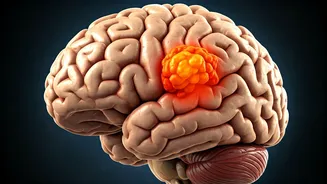Understanding Brain Tumours
A brain tumour is an abnormal growth of cells within the brain. It can originate in the brain or spread from other parts of the body. Various types of brain tumours
exist, with varying growth rates and behaviors. Some are benign (non-cancerous), while others are malignant (cancerous). The impact of a brain tumour depends on its type, size, location, and how quickly it grows. Symptoms can vary widely, including headaches, seizures, vision changes, and cognitive difficulties. Early detection and accurate diagnosis are critical for effective treatment. Treatment options, which may include surgery, radiation therapy, and chemotherapy, depend on the specific type and stage of the tumour.
Recognizing the Symptoms
Recognizing the signs of a brain tumour is crucial for timely diagnosis and intervention. Common symptoms include persistent headaches, especially those that worsen over time or are accompanied by nausea and vomiting. Seizures are another significant indicator, as are changes in vision, such as blurred vision, double vision, or loss of peripheral vision. Cognitive impairments, including memory problems, difficulty concentrating, and changes in personality or behaviour, may also indicate a tumour. Other potential symptoms include weakness or numbness in the limbs, speech difficulties, and balance issues. If any of these symptoms persist or worsen, it's essential to seek prompt medical attention and undergo a thorough evaluation.
Debunking Cancer Myths
Misconceptions surrounding the causes of brain tumours persist. One common concern is the potential link between mobile phone use and brain cancer. However, extensive research spanning decades has not established a definitive link. Major reviews of scientific studies, including those conducted over long periods, have found no increased risk of brain tumours associated with mobile phone usage. This research considered various aspects of phone use, including duration, frequency, and type of mobile phones, and consistently found no significant correlation. While it's important to stay informed about potential health risks, current scientific evidence does not support the idea that mobile phones are a significant cause of brain tumours.
Advancements in Treatment
Substantial progress has been made in understanding and treating brain tumours over the years. Advances in imaging technologies, such as MRI and CT scans, have improved the accuracy of diagnosis and the ability to pinpoint the location and size of tumours. Surgical techniques have become more refined, allowing for more precise removal of tumours while minimizing damage to surrounding brain tissue. Radiation therapy, including techniques like stereotactic radiosurgery, has become more targeted, delivering radiation directly to the tumour with reduced side effects. Chemotherapy regimens have also evolved, with the development of new drugs and treatment protocols. These advancements have improved outcomes for many patients with brain tumours and increased their chances of survival.






















